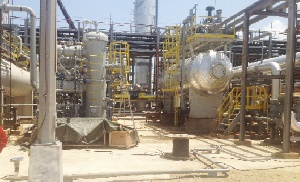 Ghana's inability to settle its debts to Nigeria has led to a reduction in the volume of gas supply
Ghana's inability to settle its debts to Nigeria has led to a reduction in the volume of gas supply
The volume of gas supplied to Ghana by Nigeria for thermal power production has reduced by about 50 percent.
Natural gas supplied by NGas via the West Africa Gas Pipeline Company Limited (WAPCo) now averages about 60mscf per day as against the contractual volume of 123mscf per day.
The situation has been attributed to the inability of Ghana to settle its long-standing debts as stipulated in the gas supply contract, and vandalism of gas pipelines in the oil-rich West African country.
Energy Expert and Board Chairman of the country’s largest power producer, the Volta River Authority (VRA), Kweku Andoh Awotwi told the B&FT: “The contractual volume that is supposed to come from Nigeria is 123mSC/ day. This year we are averaging around 60mscf, and there is some discussion to improving that to about 90msc/day.
“We are at about half of what we have been contractually promised, which is not good enough. There are many reasons for that; the vandalism of pipelines and the fact that we have not paid our bills. We owe them about GH?180million; what do you expect them to do?”
The current low volumes supplied is now being prepaid by the VRA. “Now we are getting the gas because VRA is pre-paying for that gas. We are putting in Letters of Credit (LCs) to get the gas,” Mr. Awotwi said.
An additional GH¢6billion is expected to be raised next month to clear the bulk of the GH¢10billion energy sector debt using ESLA Plc – a special-purpose vehicle created for the purpose.
Managers of the sector are optimistic that the gas supply situation will improve if the bond issuance is successful and longstanding gas debts are paid to NGas.
“So, part of the ESLA bond is to pay that debt. If we complete the ESLA bond and pay them, things will become a bit more favourable. If we are a good customers, we will create the conditions for them to continue supplying us gas.
“I see that over the next 6-12 months things should improve; it ought to improve. Sankofa is coming, TEN has started, and it balances out some of the shortfall from Jubilee,” Mr. Awotwi said.
The Sankofa oil field, which is off field Cape Three Points, is expected to deliver about 180million cubic feet of natural gas per day for thermal power production.
Operated by Tullow Oil Plc, the Tweneboa Enyenra Ntomme (TEN) fields performed well in 2017 – with gross production exceeding initial guidance, averaging 56,000 bopd (net: 26,400 bopd).
This strong performance, according to Tullow, was as a result of production and water injection optimization, which continues to be effective; and the field has performed consistently above 70,000 bopd for the last three months.
“Tullow expects 2018 gross oil production from the TEN fields to average 64,000 bopd (net: 30,200 bopd). During the year, the rig schedule and timing of drilling and completion operations will be optimised, providing upside potential to this initial estimate.
“In the last quarter of 2017, Tullow signed the TEN Associated Gas (TAG) Gas Sales Agreement with the Ghana National Petroleum Corporation – and Tullow anticipates the start of gas sales from TEN in the first half of 2018. Gross gas sales equivalent to 4,200 boepd (net: 2,000 boepd) have been forecast for the year,” the company notes on its website.